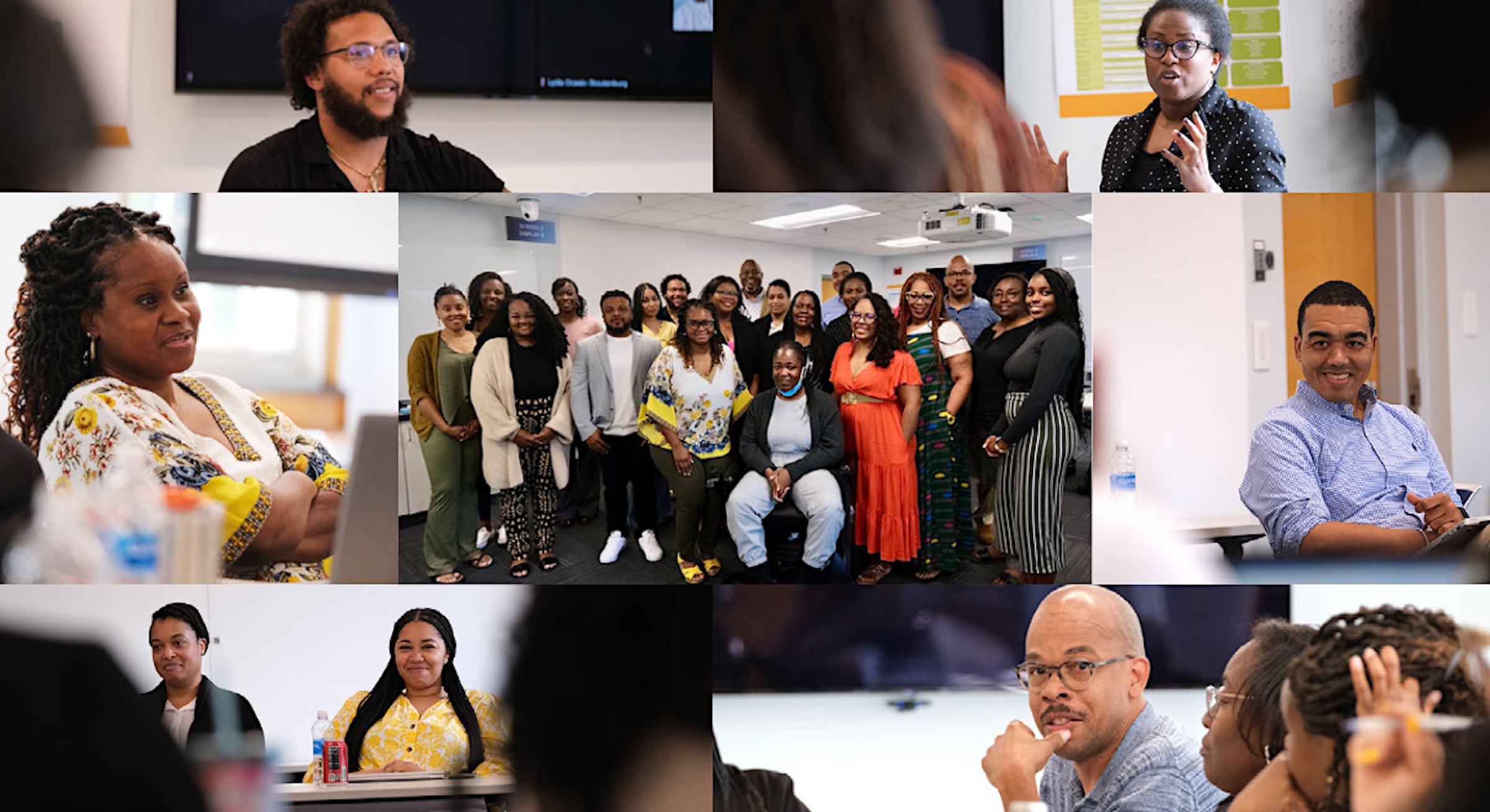On Friday, June 9, Brian Boyd, Ph.D., William C. Friday Distinguished Professor of Education in the UNC School of Education and interim director of the UNC Frank Porter Graham Child Development Institute, hosted the first in-person meeting of the Black Empowerment in Autism Network, which met in Peabody Hall on the University of North Carolina at Chapel Hill campus.
The first-of-its-kind group of Black scholars was developed to make autism research more inclusive and examine the ways that autism impacts Black children and their families. The network aims to provide opportunities for Black autism researchers and experts to connect, share their experiences and knowledge, and discuss ways to improve understanding and support for Black autistic individuals.
“We want to represent the broad range of research that we see in autism and mentor the next generation of researchers,” said Boyd, whose research, over more than 20 years, has led to effective classroom and home-based interventions for very young autistic children. “We want the group to represent a continuum of autism research with the goal of thinking about different audiences and ways to convey who we are, what we do, and what we want to accomplish.”
According to the National Center for Education Statistics, Black researchers make up approximately 7% of full-time faculty members at postsecondary institutions. Of those 7%, Black faculty research specializations are varied. As a field historically led by White scholars, autism research has had a scarcity of Black researchers and collected data that appropriately represents Black autistic populations — and the network is working toward increasing support and representation for both groups.
During the meeting, more than 20 researchers, educators, medical professionals, psychologists, speech pathologists, and social workers convened to discuss strategies to bridge the gaps in autism research and ways to enhance communication tactics between practitioners and clients, which could result in more equitable and effective outcomes for Black autistic populations. In-person attendees work at institutions and organizations across the U.S., including North Carolina Central University, University of Wisconsin-Milwaukee, Penn State University, and more. Additional researchers from across the U.S. and one from Australia also joined the meeting via Zoom.
The day began with a presentation, “The State of Autism Research for Black Folks,” led by several attendees that explored a number of facets related to autism research, including the prevalence of autism in Black populations and the shortcomings of related data, diagnosis and its timing for Black children, access to services and outcomes of those services, diversity of autism researchers and research participants, and more.
After discussions and writing exercises, the day concluded with reflections on the proceedings and next steps for the Black Empowerment in Autism Network.
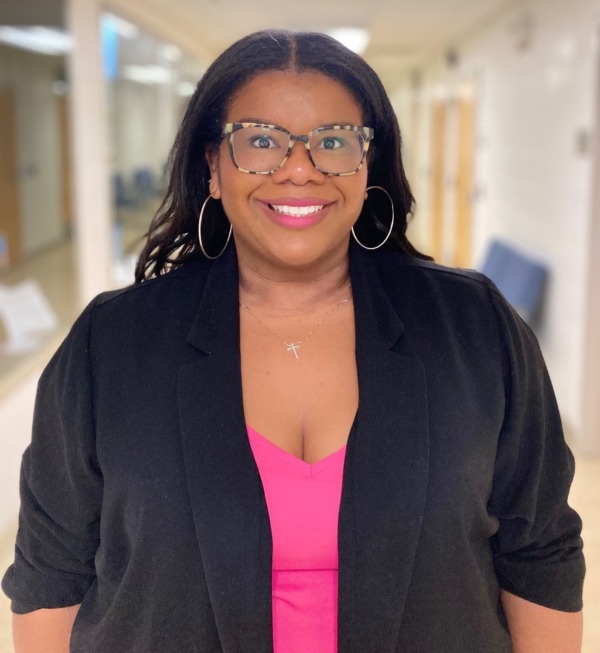
For Jamie Pearson (’09 B.A.), Ph.D., an associate professor of special education and educational equity at North Carolina State University and an integral member in the network’s development and planning, this new group signifies a platform for networking and collaboration on projects related to autism in the Black community and a safe space for Black researchers to engage in conversations that reinforce a sense of belonging.
“I am so grateful for this space to share research, perspectives, and ideas related to supporting Black autistic children, youth, and families,” Pearson said of the meeting. “This is one of the few places where I can be my most authentic self as a Black academic.”
Pearson’s sentiment was echoed by many of the attendees. Several said they were “inspired” to be at the forefront of rethinking autism research and how it can be more inclusive at every level.
“The group is about mentorship and growing the representation of Black autism researchers,” Boyd said. “We hope to create a space for Black researchers to craft a research agenda that centers the Black experience.”
“The meeting was academically and culturally fulfilling,” Boyd said. “The day allowed us to make space to have authentic and much needed conversations about crafting a research agenda that centers the Black experience in autism. The group reflected on the current state of research and where the field needs to go, but we also took time to celebrate being able to be together.”
Meet some of the meeting’s attendees and hear about their insights on the Black Empowerment in Autismâ¯Network
Nigel Pierce
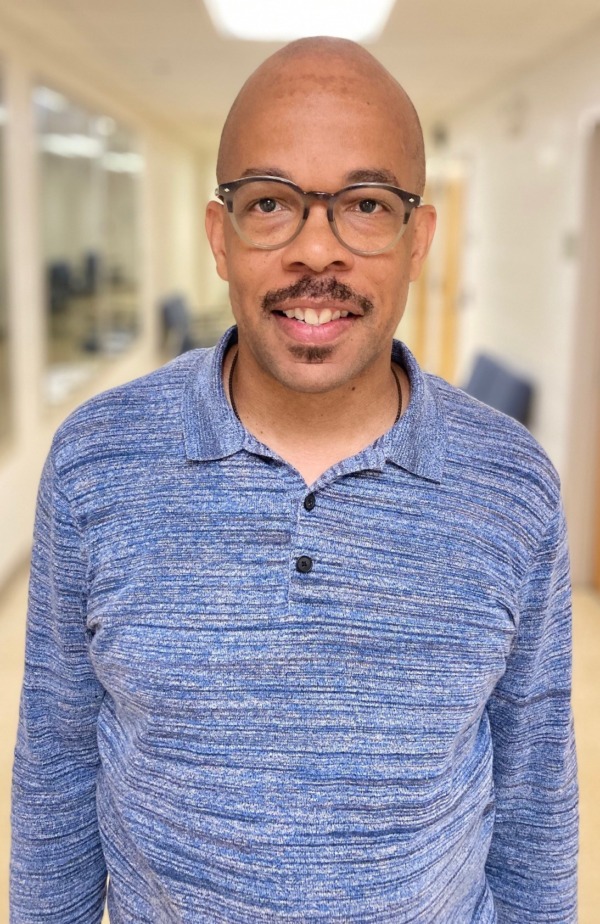
For Nigel Pierce, Ph.D., an associate professor at North Carolina Central University, his experience within autism research is grounded in his teaching as a special educator. Pierce, who played an integral role in the development of the Black Empowerment in Autismâ¯Network and the meeting’s planning committee, has mentored a variety of future special education educators that have gone on to develop expertise within varying areas of research.
With one of the network’s primary focuses including mentorship and community outreach, Pierce hopes the June 9 meeting helps to create a space for early-career researchers of color to feel supported and thrive in their work through connections with other Black scholars across multiple disciplines.
“There are still not enough researchers of color across the many fields that work with young children with autism spectrum disorder,” Pierce said. “Having a specific agenda that focuses on Black and Brown scholars will hopefully support new researchers and faculty as they navigate higher education and will help to increase qualified and productive researchers for the future.”
“The convening of this group of scholars is important because there is a need for a centered effort in examining the many ways that autism impacts Black children and their families,” Pierce said.
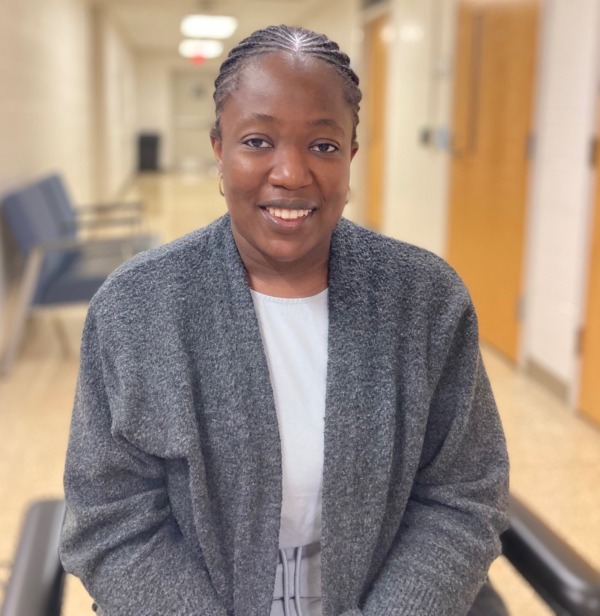
Oluwatobi “Tobi” Abubakare
Oluwatobi “Tobi” Abubakare, a doctoral student in clinical psychology at Indiana University, has navigated a distinct intersection of identities and experiences as an autistic individual. Through their lived experiences and research efforts pertaining to autism, Abubakare has noted the racial and economic inequities surrounding Black autistic individuals and their families not receiving support or assistance.
After examining the patterns related to resource access, Abubakare shares that the impact of Black autism researchers within the field helps to ensure the voices of individuals from minoritized backgrounds are incorporated into autism research efforts and provides expertise that contribute to essential conversations and advocacy efforts.
“Having autism while also being an autism researcher has been challenging given the stigma and language researchers have used to talk about autistic individuals,” Abubakare said. “It has been so helpful to be part of groups like the Black Empowerment in Autismâ¯Network where I can find some community with other researchers that share experiences as a Black autism researcher.”
Abubakare aspires for the group to develop strategies to bolster collaboration, community, and the support needed for Black autistic communities. While Abubakare continues their doctoral research and journey within academia, they hope to thrive and be a force that truly helps their communities — Black autistic and autistic.
“This group is needed to not only promote work that focuses on Black autistic communities, but also to help increase the pipeline of more Black autism researchers in the field,” Abubakare said.
Elizabeth Morgan
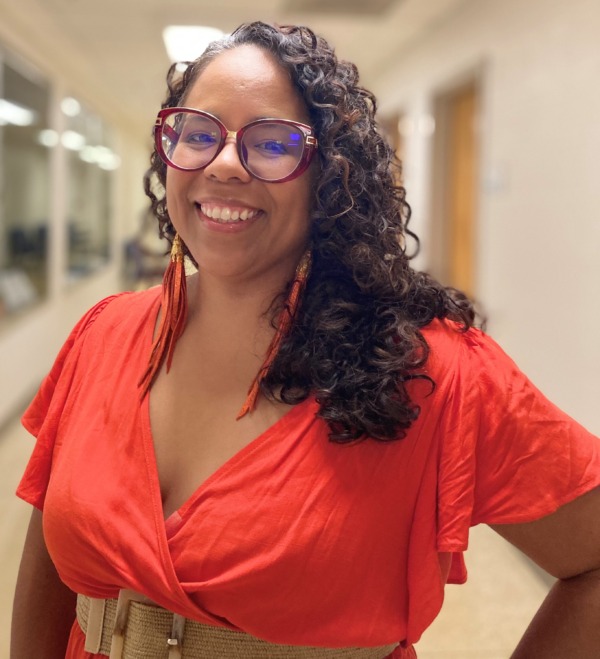
In her 20+ years as a teacher, school administrator, and autism researcher, Elizabeth Morgan, Ph.D., an assistant professor at California State University Sacramento and program coordinator at the University of California Davis Center for Excellence in Developmental Disabilities at the MIND Institute, has been in few spaces that included “Black” and “autism” in a single sentence.
Morgan said the convening of Black researchers, clinicians, social workers, and medical professionals on June 9 was an “outstanding and long overdue experience.”
“For most of my career I have been the ’only’ Black woman in my schooling and professional environments,” Morgan said. “This isolation is not always healthy and can be burdensome. I know that being in a community with like-minded, driven, and passionate Black autism researchers is exactly what I and others need to lighten the load and strengthen our work.”
Morgan’s primary hope for the network is to make community building and collaboration a top priority by nurturing a sense of community among each other, centering community-based outreach to support Black autistic people, and evoking change within research.
“Having a group such as the Black Empowerment in Autismâ¯Network that comprises researchers focused on addressing the issues that are important for Black autistic people and their families is key to filling the void in research we have had for years,” Morgan said. “We hope this work will not only impact research and practice, but also policy.”
Ashlee Yates Flanagan
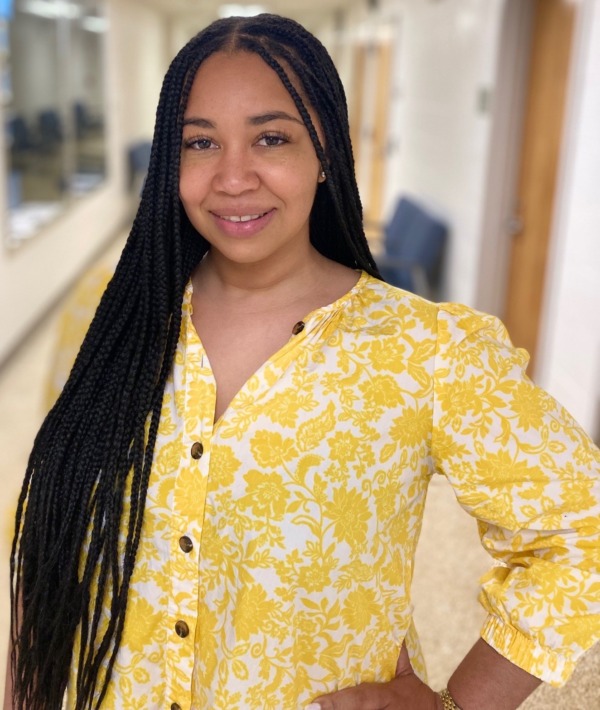
Within her research, Ashlee Yates Flanagan, Ph.D., a postdoctoral fellow at the Center for Autism Research at the Children’s Hospital of Philadelphia, focuses on the experiences of Black autistic children and their caregivers through a culturally sensitive lens.
By recognizing the socio-cultural backgrounds of Black autistic communities, Yates Flanagan said she aims to support the network’s agenda by helping to “guide the field in more accurately and sensitively reporting the experiences of Black autistic individuals and their families.”
“I believe qualitative research is integral to understanding the experiences of Black people,” Yates Flanagan said. “The passing down of stories and narratives is a part of our cultural and generational fabric. Elevating the voice of Black autistic individuals and their families not only is aligned with cultural tradition but also is necessary for empirical liberation and the genesis of new — and needed— research ideas.”
As the network continues to meet and curate ideas to further their agenda, Yates Flanagan said she looks forward to it serving as a professional development network at the intersection of Black identity and autism for researchers ranging from student status to senior researcher status and working toward promoting equity and inclusion in the field of autism research for Black scholars.
“The Black Empowerment in Autismâ¯Network provides a space for a sense of belonging for Black researchers in autism,” Yates Flanagan said. “In a field of predominantly White researchers, the network allows researchers with common interests — the empirical development and treatment of ASD in the Black diaspora and its associated outcomes — to convene and learn from one another.”
Carmen Caruthers
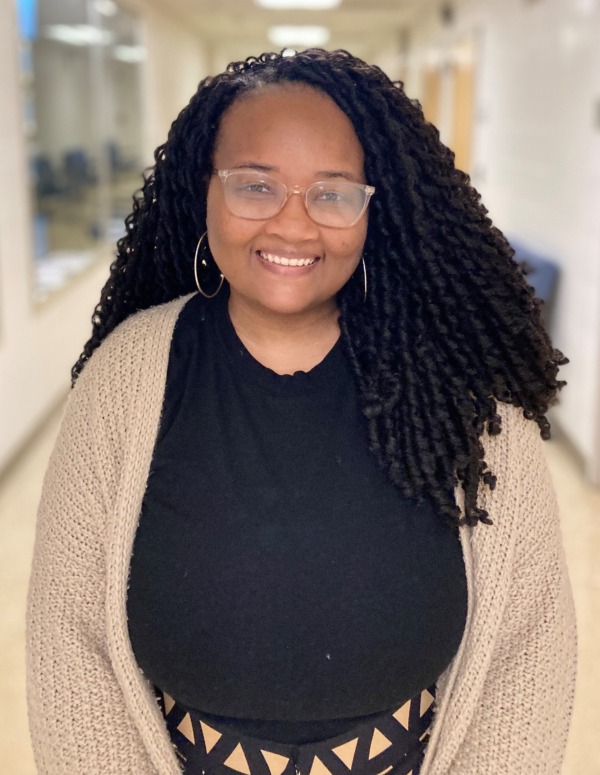
During each step of her academic and professional careers, Carmen Caruthers (’20 Ph.D.), BCBA, a staff psychologist at The TEACCH Autism Program and a clinical assistant professor in the Department of Psychiatry in the UNC School of Medicine, has been mentored by a variety of individuals who invested in her development as a researcher and promoted opportunities for both publication and conference presentations.
As she continues to focus her research on the experiences of minorized families of autistic children, Caruthers also seeks spaces that enable her to advance her expertise and feel comfortable, supported, and validated in her experiences and perspectives.
“When searching for my first faculty position, it was important to find a place that valued the unique perspective of Black autism researchers while also taking concrete steps to support their work,” Caruthers said. “I found that place at the UNC TEACCH Program and have continued to expand my research experience by joining Christina Corsello’s BFAST project as well as collaborating with other TEACCH faculty.”
Recognizing the scarcity of research for Black autistic people, specifically Black girls and women, Caruthers hopes for the next steps within the network’s tasks to consist of exploring research assessing how racial and gender differences in autism continues to expand the field’s knowledge and capturing individual’s lived experiences as they navigate diagnostic, intervention, and community systems.
“Groups like the Black Empowerment in Autismâ¯Network allow Black autism researchers to network with peers who we would not have otherwise met,” Caruthers said. “These connections have the potential to facilitate novel research ideas, powerful research collaborations, and have greater influence in autism research and policy, which hopefully improve the lives of Black autistic individuals and their families.”
Next steps for the Black Empowerment in Autism Network
According to Boyd, the network’s next steps include focusing on community outreach and connection to groups already doing work to support and uplift Black autistic individuals and their families. In addition, the network aims to submit manuscripts and other written products that will allow them to disseminate their research ideas to the broader autism community.
See the full list of attendees:
- Ashlee Yates Flanagan, Ph.D., Postdoctoral Fellow, Center for Autism Research at the Children’s Hospital of Philadelphia
- Tracy McKinney Ph.D., BCBA-D, Special Education Assessor at the Department of Defense Education Activity
- Brian Boyd, Ph.D., William C. Friday Distinguished Professor of Education in the UNC School of Education and interim director of the UNC Frank Porter Graham Child Development Institute
- Jamie Pearson, Ph.D., Associate Professor of Special Education and Educational Equity, North Carolina State University
- Ed-Dee Williams, Ph.D., Postdoctoral Fellow, University of Michigan School of Social Work and Assistant Professor, Boston College School of Social Work
- Carmen Caruthers, Ph.D., BCBA, Staff Psychologist, The TEACCH Autism Program and Clinical Assistant Professor, Department of Psychiatry, UNC School of Medicine
- Elizabeth “Liz” Drame, Ph.D., Professor and Special Assistant to the Vice Chancellor of Diversity, Equity and Inclusion, University of Wisconsin-Milwaukee
- Tyi-Sanna Jones, Ph.D., Senior Consultant, It’s A.Y.A. Independence
- Trenesha Hill, Ph.D., Assistant Professor, University of Nebraska Medical Center
- Oluwatobi “Tobi” Abubakare, Doctoral Student in Clinical Psychology at Indiana University
- Jonet Artis, Ph.D., Postdoctoral Associate, New York University
- Yolanda Keller-Bell, Ph.D., Associate Professor, North Carolina Central University
- Elizabeth Morgan, Ph.D., Assistant Professor, California State University Sacramento, and Program Coordinator, University of California Davis Center for Excellence in Developmental Disabilities at the MIND Institute
- Jane Paul, Ph.D., Director of Clinical Services, Excella Developmental Services and EDS Learning Institute
- Nicole A. Telfer, Ph.D., Postdoctoral Scholar, UNC Frank Porter Graham Child Development Institute
- Amber M. Davis, Ph.D., Postdoctoral Fellow, Johns Hopkins University
- Jonte “JT” Taylor, Ph.D., Associate Professor, Penn State College of Education
- Ifrah Abdullahi, Ph.D., Research Fellow, La Trobe University
- Twyla Perryman, Ph.D., Assistant Professor, Department of Counseling, Higher Education, and Speech-Language Pathology, University of West Georgia
- Marcus C. Fuller, Ph.D., Assistant Professor, Department of Education, University of Maryland Eastern Shore
- Nigel Pierce, Ph.D., Associate Professor, School of Education, North Carolina Central University
- Danai Fannin, Ph.D., Associate Professor, Department of Communication Sciences and Disorders, North Carolina Central University
- Allysa Ware, Ph.D., M.S.W., Executive Director, Family Voices
- Tahira Adelekan, M.D., Division Chief, Developmental Pediatrics, Dayton Children’s
- Torica Exume, Ph.D., Clinical Support Specialist, Center for Autism and Related Disabilities, Florida Atlantic University
- Lydia Ocasio-Stoutenburg, Ph.D., Assistant Professor of Education (Special Education), Penn State College of Education, Penn State
